Allah Humma Seleaala Mohmmadeen Wa Aala Aali Hi Mohmmadeen Kama Sallai Ta, Alaa Ibrahima Wa Aala Aali Hi Ibrahima Innaka Humi doum Majid Allah Humma Baarik Aala Mohammadeen Wa Alaa Aali Hi Mohammadeen, Kama Barak Ta Aala Ibrahima Wa Aala Aali Hi Ibrahima Innaka Hummi doum Majid...
Saturday, May 11, 2013
Dua for any kind of pain relief
For pain relief- Bilhak ke anzal na ho wa bil haqe nazal
look at the sky or look up and place your hand where u are pain and read, Bilhak ke anzal na ho wa bil haqe nazal
Wednesday, May 8, 2013
The Benefits of Yasin, al Waqiah, and al Mulk
The Benefits of Yasin, al Waqiah, and al Mulk
In the Name of Allah the Beneficent the Merciful Imaam Nawawi says, “One should be especially observant in reciting Surat Ya Sin (36), Surat al Waqia (56) and Surat al Mulk.(67)”
The Benefits of Yasin (36)
1. The Prophet (SalAllahu alayhi wasalam) said, ‘Surely everything has a heart, and the heart of the Qur’an is Yasin. I would love that it be in the heart of every person of my people’[Bazzar]. (S.Muhammad Ali Sabuni, Tafsir-al-SabuniVol.2)
2. The Prophet (SalAllahu alayhi wasalam) said, ‘Whoever recites Yasin once Allah will record the reward of reciting the Qur’an ten times.’[Maqal, Tirmidhi 2812/A & Dhahabi]
3. It has been reported by Aisha (radiAllahu anha)that the Prophet (SalAllahu alayhi wasalam) said that there is a surah in the Qur’an that intercedes for itsreciter and forgive its listener. Know! It is Surah Yasin. It is called ‘Mu’amma’ in the Torah. It was enquired, what is Mu’amma? The Prophet (SalAllahu alayhi wasalam) said, ‘it embraces the person with the goodness of this world and removes the dismay of the Hereafter’[Hashiya of Tafsir Jalalalayn , pg 368].
4. The Prophet said, ‘Whoever recited Surah Yasin in the night seeking Allah’s pleasure, Allah would forgive him’[Ibn Hibban, Darimi 3283/A, Abu Yala, Tabarani, Baihaqi & Ibn Mardawaih]
5. Ma`qil ibn Yasar (Allah be pleased with him) relates that the Messenger of Allah (Allah’s blessings and peace be upon him, his family, companions, andfollowers) said,”Ya Sin is the heart of the Qur’an. No one reads it intending thereby Allah and the Next Abode except that Allah forgives them. Recite it for your deceasedones.” [Related by Ahmad, Abu Dawud, Nasa'i (this wording is his), and Hakim, who deemed it rigorously authenticated (sahih)]
6. Imam Ghazali explained that this is because soundness of faith rests on acknowledging Resurrection and Judgment, and Surat Ya Sin details this in the most emphatic of ways. Imam Fakhr al-Din al-Razi concurred.
7. Imam Tibi explained in his commentary on Mishkat al-Masabih that Surat Ya Sin was called ‘the Heart of the Qur ‘an ‘ because of what it contains of overwhelming proofs, decisive signs, subtle spiritual meanings, eloquent admonition, and stern warnings.
The benefits of Surah al Waqiah (56)
8. The Prophet said, ‘Whoever recites surah al Waqiah at night would never encounter poverty’ [Ibn Sunni 620]
9. The Prophet said, ‘Surah al Waqiah is the Surah of Wealth, so recite it and teach it to your children’[Ibn Asakir]
The Benefits of Surah al Mulk (67)
10. The Prophet said, ‘There is a surah in the Qur’an which is only thirty verses. It defended whoevere\recited it , until it puts him into paradise ‘ i.e.Surah al Mulk[Fath al Qadir 5/257, Sahihul Jamiea 1/680, Tabrani inAl-Awsat & Ibn Mardawaith]
11. The Prophet said, ‘Surah al Mulk is the protector from the torment of the grave ‘[Sahihul Jamiea 1/680, Hakim 2/498 & Nasai]
12. Jabir (radiAllahu anhu) said it was the custom of the Holy Prophet sallallahu alaihe wasallam not to go to sleep until he had read Tabarakalladhi Biyadihil Mulk and Alif Laam Meem Tanzeel. [Ahmad, Tirmidhi and Darami]
13. Anas (radiAllahu anhu) reported Rasulullah (sallallahu alaiyhi wasalam) as saying, “There is a Surah which will plead for its reciter\till it causes him to enter paradise (Tabarakalladhi Biyadihil Mulk).”[Tabrani]“
No. 29 Surah No. 72 " Al-Jinn "
 | ||
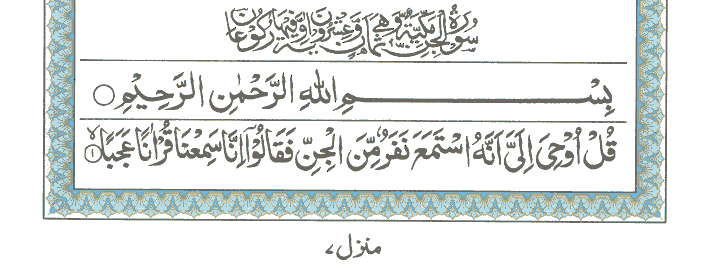 | ||
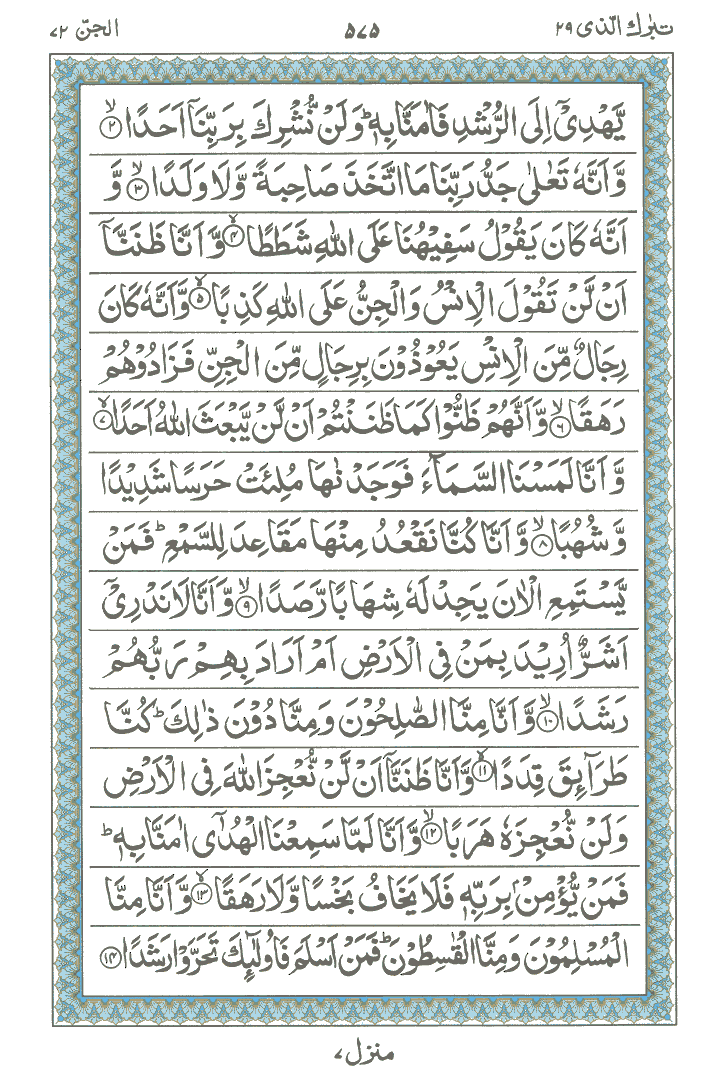 | ||
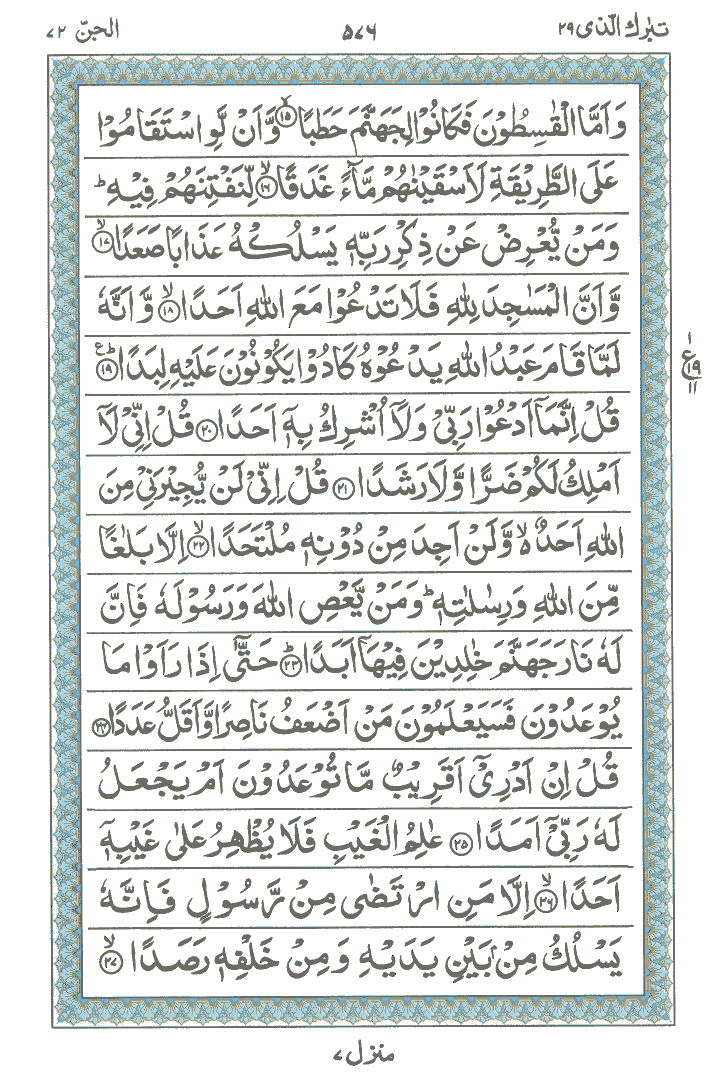 | ||
 |
(71) SURAH Nuh
1) If recited, one will not die until sees place in Janna
2) The reciter’s Hajat answered straight after recitation
(72) SURAH Al-Jinn
1) Reciter gains protection from Jinn
2) He also gains protection from unjust people
3) If recited, one will be safe from poverty
4) He will have the upper hand in confrontations
5) One’s debts will be paid
6) The safety of possessions is assured
2) He also gains protection from unjust people
3) If recited, one will be safe from poverty
4) He will have the upper hand in confrontations
5) One’s debts will be paid
6) The safety of possessions is assured
(73) SURAH Muzammil
1) Reciter will be protected from insanity
2) He will have purity of heart
3) Forgiveness is earned if recited 100 times
3) Forgiveness is earned if recited 100 times
4) One’s hajat will be fulfilled
5) Prevents slavery by people
5) Prevents slavery by people
(74) SURAH Mudathir
1) If recited, one will be protected from misfortunes
2) His hajat will be fulfilled if dua after recitation
3) Will not die until he has memorised Qur'an, if dua for memorisation is done with the recitation of the surah
2) His hajat will be fulfilled if dua after recitation
3) Will not die until he has memorised Qur'an, if dua for memorisation is done with the recitation of the surah
(75) SURAH Al-Qiyamah
1) Water - safety from heart ailments
2) The reciter will be raised with radiance on Qiyama
3) He will have an increase of sustenance
4) The recitation of this surah protects life and possessions
5) The recite will be liked by people
4) The recitation of this surah protects life and possessions
5) The recite will be liked by people
(76) SURAH Al-Insaan
1) Water - heart ailments
2) The recite will gain victory in war
3) He will also earn Jannah
(77) SURAH Al-Mursalaat
1) Water+onion juice - cure for aches and pains
2) If worn as a Tawidh, it helps to combat oversleeping
2) If worn as a Tawidh, it helps to combat oversleeping
3) Reciter will always be victorious over enemies
(78) SURAH An-Naba
1) Water - stomach problems
2) Reciter not overcome by sleep if wishes to stay awake
2) Reciter not overcome by sleep if wishes to stay awake
3) Daily recitation guarantees visit to Ka'ba
4) Safety and ease in journey
5) For eye problems, recite after 'Asr
(79) SURAH An-Naaziyat
1) Recite for safety in a dangerous place
(80) SURAH Abasa
1) Recite with Surah Takweer to be under shade of Prophet (S.A.W.) in Jannah
1) Recite with Surah Takweer to be under shade of Prophet (S.A.W.) in Jannah
2) Recite for success in all endeavours
3) Also for a safe journey
3) Also for a safe journey
Monday, May 6, 2013
The Benefits of Surah Mulk
| <<Previous | ||
| JUZ No. 29 Surah No. 67 " Al-Mulk " Ayat No. 001 to 030 | ||
|
| ||
Jabir Radiyallahu ‘anhu narrates that Nabi Sallallahu ‘alaihi wasallam did not use to sleep until he recited Alif Lam Mim Sajdah, (Surah 32) and Tabarakalladhl biyadihil mulk (Surah 67).
(Tirmidhi)
Abu Hurairah Radiyallahu ‘anhu narrates that Nabi Sallallahu ‘alaihi wasallam said: Indeed, there is a Surah in the Qur’an having thirty verses, which intercedes for its reciter until he is forgiven. And that Surah is: Tabarakalladhl biyadihil mulk (Surah 67).
(Tirmidhi)
Ibne-’Abbas Radiyallahu ‘anhuma narrates that someone, amongst the companions of Nabi Sallallahu ‘alaihi wasallam, set up his tent over a grave, without realizing that it was a grave. Suddenly he heard the person of the grave reciting Surah Mulk, upto to end of the Surah. He came to Nabi Sallallahu ‘alaihi wasallam and said: O Rasulallah I set up my tent unknowingly over a grave, and suddenly I heard someone reciting Surah Mulk up to its end. Nabi Sallallahu ‘alaihi wasallam said: It is the defender; it is the protector which safeguards him from the Punishment in the grave.
(Tirmidhi)
Ibne-Mas’ud Radiyallahu ‘anhu narrates that: The torment starts from the side of the feet of a dead man in the grave. The feet say: There is no way for you to come through us, for he used to recite Surah Mulk {Surah 67). Then the torment advances towards him from his chest or the stomach. It says: There is no way for you to come through me, for he used to recite Surah Mulk. Then the torment advances from towards his head. The head says: There is no way for you to come through me, as he used to recite Surah Mulk. (‘Abdullah ibne-Mas’ud says) This Surah prevents the torments of the grave. It was also called Surah Mulk in the Taurat (Torah). He who recites it at night, is indeed blessed with a tremendous reward.
(Mustadrak Hakim)
(Tirmidhi)
(Tirmidhi)
(Tirmidhi)
(Mustadrak Hakim)
Virtues of The Quran
Hadhrat Abdullah bin Masood Radiyallahu ‘anhu narrates that The Messenger of Allah Sallallahu ‘alaihi wasallam said: “Whoever reads one letter of the Qur’an receives the reward of one good deed. And one good deed is multiplied ten times.
(Kanzul Ummaal)
Uthman Radiyallahu ‘anhu narrated that the Messenger of Allah Sallallahu ‘alaihi wasallam said: “The best of you is he who learns the Qur’an and teaches it.”
(Bukhari)
(Bukhari)
Uqbah bin Amir Radiyallahu ‘anhu reported that Rasulullah Sallallahu ‘alaihi wasallam said: “Will not any of you go to the Musjid and learn or read two verses from the Book of Allah (For) that is better for him than two she-camels, and three (verses) are better for him than three (she-camels), and four (verses) are better for him than four (she-camels). And the number (of verses read in total) is better than the same
number of camels.”
(Muslim)
number of camels.”
(Muslim)
It is narrated that Rasulullah Sallallahu ‘alaihi wasallam said: “There is no envy (acceptable) except in two (cases): a person whom Allah has given the Qur’an and recites it throughout the night and thorughout the day. And a person whom Allah has given wealth, that he gives throughout the night and throughout the day.”
(Bukhari, Muslim)
(Bukhari, Muslim)
Ibn Masud Radiyallahu ‘anhu narrates that Rasulullah Sallallahu ‘alaihi wasallam said: “Whoever reads a letter from the Book of Allah Subhanahu wa Ta’ala will receive a hasanah (good deed) from it (i.e. his recitation), and the hasanah is multiplied by ten. I do not say that Alif-Laam-Meem is (considered as) a letter, rather Alif is a letter, Laam is a letter, and Meem is a letter.”
(Tirmidhi, Darimi)
(Tirmidhi, Darimi)
It is narrated that Rasulullah Sallallahu ‘alaihi wasallam said: “He who is skillful in reciting the Qur’an is with the unveiled, honorable, and pious, and he who stutters when reading the Qur’an, and its recitation is difficult upon him, will receive two rewards.”
(Bukhari)
(Bukhari)
It is reported that Rasulullah Sallallahu ‘alaihi wasallam said: “Verily he who has nothing of the Qur’an in his heart, is like a house (which has been) destroyed.”
(Tirmidhi)
(Tirmidhi)
Abu Umama Radiyallahu ‘anhu narrated that Rasulullah Sallallahu ‘alaihi wasallam said: “Read the Qur’an. For verily it will come forth on the Day of Resurrection as an intercessor for its readers.”
(Muslim)
(Muslim)
It is narrated that the Prophet Sallallahu ‘alaihi wasallam said: “The Qur’an is an intercessor (which by Allah’s permission) intercedes and an opponent (which is) truthful. He who appoints it as his leader, (then it) will lead him to Paradise. And he who puts it behind him, (then it) will lead him to the Fire.”
(Bayhaqi)
(Bayhaqi)
`Abdullah ibn `Amr Radiyallahu ‘anhu reported that the Messenger of Allah Sallallahu ‘alaihi wasallam, said: “The fast and the Qur’an are two intercessors for the servant of Allah on the Day of Resurrection. The fast will say: ‘O Lord, I prevented him from his food and desires during the day. Let me intercede for him. The Qur’an will say: ‘I prevented him from sleeping at night. Let me intercede for him.’ And their
intercession will be accepted.”
(Ahmad)
intercession will be accepted.”
(Ahmad)
It is narrated by Abu Musa that the Prophet Sallallahu ‘alaihi wasallam said: “Maintain learning the Qur’an, by heart for verily it is greater in escaping from the chests of men than camels from their reins.”
(Bukhari, Muslim)
(Bukhari, Muslim)
Umar bin Al-khattab Radiyallahu ‘anhu narrated that Rasulullah Sallallahu ‘alaihi wasallam said: “Verily Allah raises nations by this book (the Qur’an) and puts down (i.e. destroys) others by it.”
(Muslim)
(Muslim)
Saturday, May 4, 2013
Ahad Namah
Ahad Namah:
English translation:
In the Name of Allah, The Beneficent, The Merciful
O Allah! The Creator of the skies and the earth
The Knower of the hidden and the open
Your are The Beneficent, The Merciful
O Allah! I promise you in this earthly life
and I bear witness that
that there is no one worthy of worship except You
You are One and Only without any partner
and I bear witness that
Sayyidina Hazrat Muhammad Sallallahu alaihi wa Sallam
is Your servant and Your Messenger
(O Allah!) Please do not leave me to my own self
Because if You abandon me to my own desires
I might be drawn towards evil and away from goodness
and I have no support except Your Mercy
So accept my promise with You
to be kept till the Day of Judgement
Truly, You never break a promise
And may the blessings of Allah, The Exalted
be on his best creation
Sayyidina Hazrat Muhammad Sallallahu alaihi wa Sallam
and on his family and all companions
(O Allah! Accept this prayer)
With Your Mercy, O The Most Merciful of those who show mercy.
Ahad Naamah
ALLAHUMMA SALLI WASALLIM WABARIK ALA SAYYIDINA MUHAMMADINIL FAATIHI LIMA UGHLIQA WAL KHAATIMI LIMA SABAKA WAN NAASIRIL HAQQA BIL HAQQI WAL HAADI ILA SIRAATIKAL MUSTAQEEMI SALLAL LAAHU ALAIHI WA ALA AALI WA ASHABIHI HAQQA QADRIHI MIQDAARIHIL AZEEM.
Qadri kar Qadri rakh Qadriyon mein utha
Qadre Abdul Qadire Qudrat numa ke Waaste
Ahad Naamah
Sayyidina Rasuli Akram Sall Allahu alaihi wa Aalihi wa Sallim said : "Whoever recites this Ahad Naamah one in his lifetime, he will be taken away with Imaan [true faith] in his heart."
And Rasulullah Sall Allahu alaihi wa Aalihi wa Sallim says that he guarantees that this person will go to Jannah [Paradise].
Hazrat Jaabir Rathia Allahu anh says that he heard Rasulullah Sall Allahu alaihi wa Aalihi wa Sallim say: " Man has three thousand [3000] types of diseases in his body, One thousand of these diseases doctors have medicine for and they can treat these. two thousand are such that there is no medicine to cure them. Whoever will keep this Ahad Naamah with them Allah [Subhaana Hoo] will save him from the two thousand [2000] diseases.
Hazrat Abu Bakr Siddiq Rathia Allahu anh says, " Whoever keeps this Ahad Naamah with him will be safe from snakes and scorpions, and magic will have no effect on him and people who think bad of him will not be able to say anything bad about him.
Hazrat Khaatuna Jannat Rathi Allahu ta 'ala anhaa says she heard Sayyidina Rasuli Akram Sall Allahu alaihi wa Aalihi wa Sallim say: "Whoever will use this Ahad Naamah in a time of difficulty his need will be fulfilled".
Whoever will write this Ahad Naamah with Misk [musk] and Zafran [saffron] and drinks it, washing it with water, his aql [intelligence] will improve, and whoever memorizes it or some of it and whatever he memorizes he does not forget, that will also help his memory.
Hazrat Amir ul Mu'mineen [the isnaad doesn't say which] Rathia Allahu anhu says that whoever reads this Ahad Naamah and give the thawaab to someone who is deceased, the grave of such a person will be lighted from east to west.
If someone puts it in the grave, the deceased person will :
When Munkar and Nakir [the questioning angels] come to question him their questions will be made easy on such a person. Allah Subhaana Hoo will take the Athaab [chastisement] away from his grave one lakh yards [one hundred thousand] to the right, forty thousand yards to the left, forty thousand yards from his head and forty thousand yards from his feet. The grave will be so wide that the eye will not be able to comprehend.
Allah Subhaana Hoo has given this property to this Ahad Naamah, If it is kept in a grave on Yawm ul Qiyaamah [the Day of Standing] the person will rise from the grave as if it is an angel and he will wear the garments of Jannah [Paradise]. He will have Buraaq for riding and Allah Subhaana Hoo will say to this person: "I have an Ahad [covenant] with you that you will be happy because you read this Ahad Naamah in the world every day. I am going to fulfill this promise today and I am going to put a crown on your head and I am going to give you the garments of Jannah. I am going to give you Buraaq to ride on. There will be no questioning from you and you will be sent to Jannah without any chastisement and I will also forgive any person who you ask me to forgive." And he will be sent to Jannah in this manner. His face will be lit like the full moon on the fourteenth night. The people of Mizaan ul Hashr will say that this person must be a prophet or a Wali or one of the Salihoon. The Angels guarding Jannah will say: " No, this person is not a Prophet, he is just a slave of Allah Subhaana Hoo from the Ummah of Rasulullah Sall Allahu alaihi wa Aalihi wa Sallim. The only reason his face is lit like this and why he is wearing the garments of Jannah is because he used to keep the Ahad Naamah with him and this is the Noor and Barakah of this Ahad Naamah, that he is in this blessed position." The people will say: "We were in the world for such and such a time. It is sad that we did not use Ahad Naamah at that time, and we were sort of away from it."
Read more:http://ashraf786.proboards.com/index.cgi?board=duas&action=display&thread=8496#ixzz2SNl2wNts
Wednesday, March 20, 2013
Saturday, February 23, 2013
Tuesday, February 5, 2013
Friday, February 1, 2013
Hazrat Muhammad Sallallahu Alaihi Wasllam Rozae Mubarak and Imam Hussain Rozae Mubarak !



Foot prints of our Beloved Prophet Muhammad (P.B.U.H)......
MASHALLAH
Recite once durood... And say SUBHANALLAH
Belongings of Prophet Muhammed (SAWW)

MA'SHAA'ALLAH
The SHRINE OF HAZRAT IMAAN HUSSAIN ( A.S )
There is a lot of benefit and great spiritual reward in visiting the grave of Hazrat Imam Husayn Alaihis Salam. The Prophet Salallaahu Alaihi Wassallam has said of his grandson Imam Husayn [a]:
“Husayn is of me and I am of him”. The visiting the grave of Imam Husayn [a] relieves one of worldly afflictions as well as those after death.
Monday, December 17, 2012
Dargas' And Walis'


CHAND SHAH WALI Dargah Powai
Mazar of Hazrat LaL ShAhBaZ Qalander At sehwan shareef

KAMAR ALI DARVESH

Hazrat Haji Sayed Gulab Shah Baba,Byculla, Mumbai.
This mazar opens only once in a year on 26th January as this mazar is inside Richardson and Cruddas Iron works at Byculla.
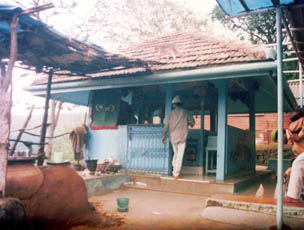
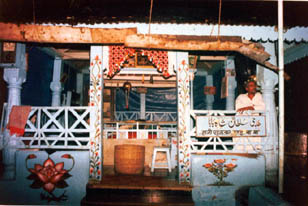




Hazrat Haaji Bakhtawar Shah Baba Ra. (Old)
First Salaami

Hazrat Sultaan Shah Baba Ra. (Old)
Second Salaami

Haji Malang Dargah Sharif
Third salami

Sabirpia Bawa

Mazar-e-Sabir Piya

Naugaja Peer Baba

Indore Sharif

Sharif Hazrat Bahauddin Shah Baba (r.a)- Mumbai
Main roza of Hazrat Peer Sayyed Baddruddin Hussaini- India
Hazrat Ismail Shah Baba-India
Hazrat Kamli Shah Baba
Makhdoom Shah Baba
Unjha Sharif-Mira Datar

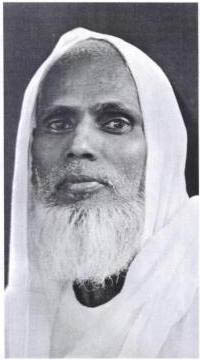
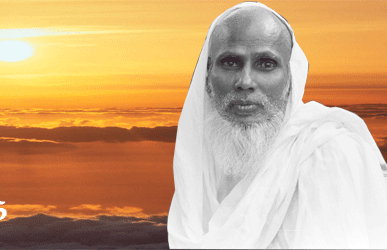

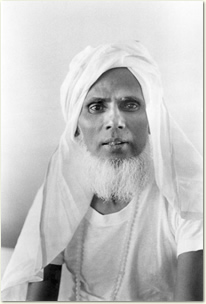

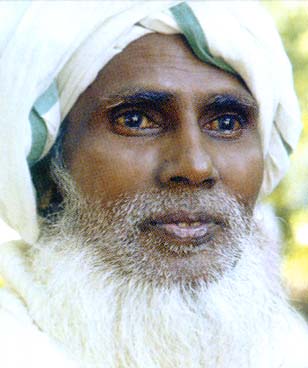

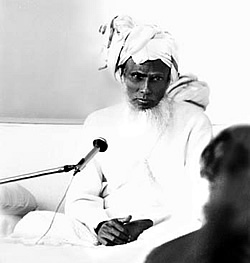




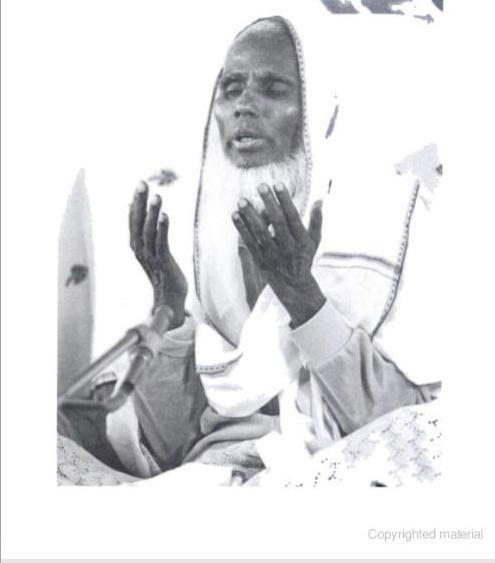






Before the Mazar was built
This is a photo at Bawa's grave of the 40th day of the passing of Muhammad Raheem Bawa Muhaiyaddeen, the Sufi saint, who left this earthly existence on December 8th 1986.
East Fallowfield PA
Photo taken January 1987
A STORY
I must tell this story which I have not shared with only a few since 1987.
I stood right center (in the photo) for most of the prayers on the 40th day for Bawa.
About halfway through I heard a flock of Canadian geese. They came at an angle about 100 yards away (which would now be the field in back of the Mazar) They turned and in a V formation they flew right over top of Bawa's grave. They were about 25-30 feet off the ground. So close I swear you could see the details in their feathers. They honked as they did the flyover saluting Bawa. I was so awestruck that I never even took a photo. I could not believe what was happening.


BAWA'S GRAVE AT SUNSET
BEFORE THE MAZAR WAS BUILT OVERTOP
BEFORE THE MAZAR WAS BUILT OVERTOP
Muhammad Raheem Bawa Muhaiyaddeen in PHILEDEPHIA
M. R. Bawa Muhaiyaddeen

"Within your heart in a space no bigger than an atom, God has placed the 18,000 universes, good and evil, and the wisdom to differentiate between them. That is your farmland. If you plow that land deep with your wisdom and sow God's qualities and actions with the knowledge of the difference between good and evil, you will receive the wealth of your soul, the bountiful harvest of undiminishing grace."
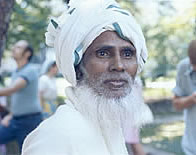
"What we are slaves to will prevent us from praying to God. If we are slaves to all the thoughts we think, if we are slaves to everything our eyes see, if we are slaves to all the music our ears hear, if we are slaves to everything the nose smells and the tongue tastes, if we are slaves to everything the body wants, then how can we ever reach a state of peace? We can never know peace or tranquility this way. We have to escape from this slavery and become a slave only to God."
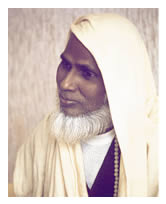
"Always use positive words, and never use negative or evil words. Cultivate good thoughts, not bad thoughts. Make sure your intentions are constructive intentions. Never be jealous; be grateful. Be tolerant, peaceful, and honest instead of vengeful. Always be compassionate, never proud and arrogant. Praise God, because God is the Deserving One. You need these in your life. If you can teach yourself to follow these suggestions, you will have a very good life."
God's Psychology (unpublished to date)
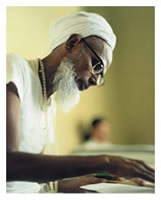
"You must place your faith in the one indestructible, imperishable God. To do this, you must stop depending on the kings, forces, and armies within you. When you give up all this and stand defenseless and alone, saying, O God, it is all Your will! The sheikh will stand by your side. It is only when you surrender to Allah that the sheikh, who is the explaining wisdom of the Qutbiyyat which guides you on the path of God, will come to stand by your side. 'Son' he will say, 'Now you are ready. Come, let us go'."
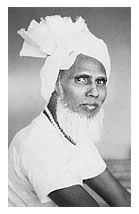
"This is the only path on which we can proceed with ease. It is the path to the freedom of our soul. Therefore, may we protect ourselves and give love to others. May we protect others as we would protect ourselves, love our neighbors as ourselves, and make all mankind our relatives, our brothers and sisters. May we make everyone our loved ones and help them become those who trust in God. May we all go together on this path as the followers of God, as the representatives of God, as the children of the one Father."
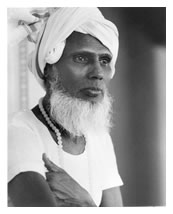
"To all those who say they believe in God, please realize with faith that God hears every word you say. God hears your every thought. Realizing this, speak only what is truth and act only with God's qualities of love, compassion, justice, patience, and the realization that each life is as important as your own."
January 10, 1979


Abdul Raheem

an Video Interview 5/15/2011 Bawa Muhaiyadeen Fellowshttp://www.youtube.com/watch?v=pkkgHSKTHXY
Urs Bawa Muhaiyaddeen RA MAY 2012 (Recent)
Haji Abdul Rehman Shah Baba,Mumbai

Mama Haji Ali Dargah. - Worli, Mumbai, India.
Hazrat Shaikh Khwaja Syed Muhammad Nizamuddin Auliya
ROZA SHARIF HAZRAT KHAWAJA MOINUDDIN CHISTI (AJMER INDIA)
Life History of Khawaja Ghareeb Nawaz of Ajmer Shareef - MUST WATCH -b
Life History of Khawaja Ghareeb Nawaz of Ajmer Shareef - MUST WATCH -b
http://www.youtube.com/watch?v=2iRqF8s4vUc


Sultan E Hind"
Sahenshah E Hind"
Waliyo Ke Wali"
Hind Ke Raja"
Son of Hazrat Khawaja Moinudin Chisty R.A.
Hazrat Khawaja Fakaruddin Chisty R.A. Ka Urs Sharif Mubarak Ho.
Sahenshah E Hind"
Waliyo Ke Wali"
Hind Ke Raja"
Son of Hazrat Khawaja Moinudin Chisty R.A.
Hazrat Khawaja Fakaruddin Chisty R.A. Ka Urs Sharif Mubarak Ho.
Mazar of Hazrat Khwaja Nizamuddin Auliya Aurangabadi ( rahmatullah alayh)
Panch Peer- India
| ||||||||||
| The Great Sufi Saint Sheikh Dayem Ullah Sixth Khalifa of Holy Dayera Sharif Azimpur Died on Jan 1995 | ||||||||||
| ||||||||||
| |||||||||
The Holy Mazar Shairf of The Great Sufi Saint GaosePak MuhiUddeen Abdul Qadir Jilani (RA) of Baghdad |
He is Hasani and Husaini
Shaikh Muhammad Raheem Bawa Muhaiyaddeen

See a movie at http://www.youtube.com/watch?v=lBBmfo2u_Dw
A short visit on May 9th 2010 to the mazar in East Fallowfield Pennsylvania near Philaselphia.
Andavan song sung in Tamil by Bawa Muhaiyaddeen - copyright by the Bawa Muhaiyaddeen Fellowship
More about the mazar athttp://www.bmf.org/fellowship/index.html
Some forty miles from Philadelphia, among the rolling hills and tall trees of Chester County, is the Mazar, the resting place of Muhammad Raheem Bawa Muhaiyaddeen, the Sufi saint, and founder of the Bawa Muhaiyaddeen Fellowship, who passed away in 1986.
This beautiful Mazar, the first in the United States, was conceived, designed, and built by the members of the Bawa Muhaiyaddeen Fellowship, and dedicated in 1987.
All are welcome to visit the Mazar of Sheikh M. R. Bawa Muhaiyaddeen (Ral.) between sunrise and sunset everyday.

The most universally acclaimed saint of all times and the most celebrated, in all the aalameen (worlds), among jinnn and men as well as among the arwaah (souls) and the malaika (angels), the beloved ofAllahTa'ala who throughout history has been showered the titles of muhyudeen (reviver of faith),qutbRabbani and ghauth-al-a'zam (the greatest helper), Sayyidi wa Imami Shaykh-ul-AkbarAbu Muhammad Abdul Qadir Jilani, Radhu Allahu Anh was born in Ramadan 470 A.H/1077 CE in Jilan, Persia. His father's name was Abu Salih, a man of taqwa (piety) and a direct descendant ofHadrat Imam Hasan ibn Ali Rady Allahu Anh. His mother Ummul-Khair Fatima was a saintly daughter of a saintly father Shaykh Abdullah Sawma'ee who was a direct descendant of Hadrat Imam Husain ibn AliRady Allahu Anh.
Thus Muhyudeen Shaykh Abdul Qadir Jilani was both Hasani and Husaini, a descendant of the Holy Prophet, Sallallahu alaihi wa Sallam. For this reason, the Sindhis for example, lovingly call him "putarmithe mahboob jo" (the blessed son of the sweet beloved Holy Prophet), Sallallahu alaihi wa Sallam.
Yaa Hayyu Yaa Hayyu Yaa Qayyum
Yaa Hayyu Yaa Hayyu Yaa Qayyum
He Reached The State of Siddiqeen
The Holy Prophet MuhammadMustafaSallallahu alaihi wa Sallam is the last Prophet, there is no prophet after him. But people can still aspire to spiritual progress, acquire taqwa (piety) and saintliness and become Awliya Allah (friends of Allah). And the highest spiritual state after anbiya (prophets), belongs to the Siddiqeen (the truthful) that is why the Holy Prophet taught us to make thedua:Allahummaj 'alna min-as-Siddiqeen (O Allah make us among the truthful). Well, Shaykh Abdul Qadir Jilani Rady Allahu Anh manifested to the world that he ranked among the siddiqeen at the ripe age of 18. At that age, his thirst for knowledge and eagerness for the company of the Awliya Allahtook him to the city of Baghdad.
It is related that as he was about to leave home on this momentous journey, his widowed mother sewed forty gold coins inside his coat as part of his inheritance, and as parting advice told him to be forever truthful. The caravan with which he was travelling had gone as far as Hamadan when it was attacked by a gang of robbers. In the course of their loot, one of the robbers asked him whether he had anything with him and he truthfully replied that he had forty gold coins sewn in his coat. The robber obviously thought he was joking and narrated this incident to his chief who decided to come and see this young man. When his coat was torn open, sure enough there were forty gold coins. The gang leader was astounded. He asked Shaykh Abdul Qadir Jilani as to why he revealed this when he could have very well kept it secret. Shaykh Abdul Qadir Jilani told him that his mother had advised him not to lie and he was duty bound to obey his mother, Hearing this, the gang leader was overpowered with remorse, repented, accepted Shaykh Abdul Qadir Jilani as his Shaykh and so did all his followers and they went on to acquire wilayah (sainthood) themselves. This is how Shaykh Abdul Qadir Jilani came to be ranked among the Siddiqeen. Allahummaj 'alna min-as-Siddiqeen, Aameen Yaa Rabbal 'Aalameen.
Sayyid Hajji Abdul Raheem Bin Sayyid Muhammad Ismail Shirazi has captured the essence of this incident most beautifully in the following verses of his Urdu poem on the Gauth-al-A'zam:
Choron pay tum nay kar kay tawajjoh Abdaal banaaya 'aali shaan Yaa Gauth-al-A'zam ajab tumhaaree shaan
Focussing your spiritual glance at the thieves You turned them into great saints O, the great helper, your stature is truly astounding (Gulzare Tayyiba, vol 3, p 18)
Yaa Hayyu Yaa Hayyu Yaa Qayyum
Yaa Hayyu Yaa Hayyu Yaa Qayyum
Sharia, Tariqa and Haqeeqi Ma'rifa
In matters of Shariah (sacred Muslim law), Shaykh Abdul Qadir Jilani Rady Allahu Anh followed the Hanbal Madh-hab (school of sacred Muslim law) but was an authority on the Shafi-i-Madh-hab as well, and a chief exponent of the Ahl us-Sunnah wal Jama'ah (the people who follow the Sunnah of the Holy Prophet and the Jama'ah of his blessed companions). The way to draw nearer to Allah Ta'alais through additional voluntary prayers day and night, through constant remembrance (Zikr), unceasingsalawaat (Durood) on the Holy Prophet Sallallahu alaihi wa Sallam, Sunnah fasting, charity, zuhd(abstinence) and juhd (exertion in the way of Allah Ta'ala) as exemplified by the Holy Prophet himself. This then is the tariqa (spiritual path leading to Allah Ta'ala) which is rooted in sharia (sacred Muslim Law).
A Shaykh, musk-scented in shariah, tariqa and haqeeqi-ma'rifa (knowledge of Allah Ta'ala) is able to ascertain the spiritual level of a mureed (disciple) and can assign additional awraad and azkaar(voluntary prayers) to be performed to attain spiritual progress. Shaykh Abdul Qadir Jilani learnedtariqa at the hands of Shaykh Hammad Bin Muslim al-Dabbas, Rahmatullahi alaih. Traditionally when someone is appointed a khalifa of a Shaykh in tariqa, he is given a khirqa. Shaykh Abdul Qadir Jilani was bestowed the khirqa by ShaykhQadi Abi Said al-Mukhrami, Rahmatullahi alaih.
The tariqa followed by Shaykh Abdul Qadir Jilani Rady Allahu Anh came to be called after him theQadiriyya tariqa and it came to be universally accepted as a divinely-guided path to spiritual progress through zikr of Allah to polish one's heart of all evil, to lead a virtuous life, to attain the love of the Holy Prophet, Sallallahu alaihi wa Sallam, the love of the sahaba (companions) and the Ahle Bayt (the Prophet's blessed household), the love of the awliya (saints), and to follow the sharia (sacred Muslim law) according to the teachings of any one of the four Imams of madh-hab, that is Imam Abu Hanifa, Imam Shafi-i, Imam Malik and Imam Ahmad bin Hanbal, may Allah Ta'ala be pleased with them all.
Any tariqa has a silsila or spiritual chain linking the teachings of the Shaykh to the teachings ofRasulullah Sallallahu aliahi wa Sallam. The spiritual geneology of Shaykh Abdul Qadir JilaniRadyAllahu Anh is traced back to the Holy Prophet as follows:
Shaykh Abdul Qadir Jilani, disciple of
Shaykh Qadi Abi Said Ali Mubarak al-Mukhrami, disciple of
Shaykh Abul Hasan Ali Ahmad Qareshi al-Hankari, disciple of
Shaykh Abu Farah Muhammad Yusuf Tartusi, disciple of
Shaykh Raziuddin Abul Fazl Abdul Wahid Abdul Aziz, disciple of
Shaykh Abu Bakr Abdullah Shibli, disciple of
Shaykh Abul Qasim Junaid of Bagdad, disciple of
Shaykh Abul Hasan Siri Saqti, disciple of
Shaykh Maroof Al-Karkhi, disciple of
Shaykh Sulaiman Dawood Tai, disciple of
Shaykh Habib ul Ajami, disciple of
Shaykh Hasan al-Basri, disciple of
Sayyidina Ali ibn Abi Talib, Khalifaof
Sayyidina Muhammad ibn Abdillah, Nurin-min-Nurillah,
Allahumma Salli wa Sallim wa baarik alaih.
The names in this silsila (spiritual chain) are given in the Tawassul of Qadiriyya in the kitab Abdul Qadir Fee Eedahittasawwuf compiled by Nuriddeen ibn Shaykh Husain Mahmud al-Ghasani as well as in the biography of the Shaykh by Dr. Zahurul Hasan Sharib.
Yaa Hayyu Yaa Hayyu Yaa Qayyum
Yaa Hayyu Yaa Hayyu Yaa Qayyum
Nasiha
Shaykh Abdul Qadir Jilani Rady Allahu Anh taught Muslims and preached to non-Muslims in Baghdad. His Khutbas (sermons) and Nasiha (advice) have been compiled and handed down through centuries as classics of Muslim spirituality.
His major spiritual works in the field are:
1. Sirr al-asrar (The secret of secrets)
2. Futuh al-ghayb (Revelations of the Unseen)
3. Ghunyat al-talibeen (Wealth for Seekers)
4. Al-Fat'hu Rabbani (The Endowment of Divine Grace)
Besides the Qur'an Kareem and Hadith Shareef, these are required minimum reading for someone who aspires to be an aalim (learned). As we read his masterpieces, we are struck by the fact that his style of expression is different from that of any other Shaykh, aalim or wali. He is so much saturated with the spiritual power of Tawheed that his exposition and its flow has a spiritually confident personality all its own so that anyone who reads his khutbas spontaneously admits that he is thequtb-al-aqtaab, the Shaykh-ul-Mashaaikh, the Gauth-al-A'zam and much more.... a Shaykh who epitomised mujaddidiyya (faith revival) and wilayah (sainthood).
Yaa Hayyu Yaa Hayyu Yaa Qayyum
Yaa Hayyu Yaa Hayyu Yaa Qayyum
Azkaar, Salawaat and Qasida
The Qadiriyya tariqa is a tariqa of Zikrullah, remembrance of Allah. The plural of Zikr is azkaar. Theazkaar and awraad (daily voluntary prayers) of Shaykh Abdul Qadir JilaniRady Allahu Anh have been compiled in many kitaabs (religious books), one of which is Fuyudhaatur-Rabbaniyya, compiled by al-Hajj Ismail Ibn Sayyid Muhammad Sa'eed Al-Qadiri. It gives the awraad and azkaar ofShaykh Abdul Qadir Jilani for each day of the week as well as for various special occasions.
Then we have the salawaat (durood) on the Holy Prophet Sallallahu alaihi wa Sallam recited by theGauth-al-A'zam and we have to read Fuyudhaatur-Rabbaniyya as well as his major classics to appreciate how profuse Shaykh Abdul Qadir Jilani was in sending salawaat and salaam on the Holy Prophet, Allahumma salli wa sallim alaih. His most famous salaat is called As-Salatu Gauthiyaafter him while he also recited As-Salatul Kubra (The big salaat) and kibritil ahmar (the philosopher's stone). Kibritil ahmar is given in both Fuyudhaatur-Rabbaniyya as well as in Miskaatus-Salawaat ofMawlana Muhammad Elias Burney. "The pholosopher's stone" means something very rare to find.
His emphasis in immersing yourself in the Asma Allah-ul-Husna (the most Beautiful Names of Allah Ta'ala) until they run through your veins is breathtaking. He has woven a qasida (hymn) of 63 verses around these Asma-ul-Husna whose opening verses are:
Shara'tu Bi Tawheedil Ilahi Mubasmilaa
Sa Akhtimu Bi-dh-dhikril Hameedi Mujammila
Wa Ash-Hadu Annallah Laa Rabba Ghairuhu
Tanazzaha 'an Hasril Uquli Takammulaa
(transliteration from Fuyudhaatur-Rabbaniyya, p 52)
I start the Tawheed of Allah with Bismillah.
I will finish with the Zikr of Allah, the Most Beautiful.
And I bear witness that there is no Lord other than Allah. Glorified is He, beyond human understanding, Most Perfect.
And his qasida Gauthiya is universally popular. It is chanted from Rabat to Lahor and from Mombasa to Toronto. Shaykh Abdul Qadir Jilani Rady Allahu Anh passed away on 11 Rabi-ul-Akhir 561 A.H/1166 C.E, at the age of 91. Those in the Qadiriyya tariqa recite Qur'an Kareem and do Zikr on that night. In the Indian sub-continent, it is called Gyaarween shareef, or the blessed eleventh night of the month. Qasida Gauthiya is also recited. In it, ShaykhAbdul Qadir Jilani gives us some of the secrets of his own spiritual stature. Consider the spiritual force with which the opening lines burst upon you:
Saqaanil hubbu kaasaatil wisaalee
Faqultu likhamratee nahwee ta'aalee
When we read the classics of Shaykh Abdul Qadir Jilani Rady Allahu Anh like Sirr al-asrar, Futuh al-ghayb, Ghunyat al-talibin, Al-Fat'hu Rabbani, and qasida Gauthiya and recite the awraad andsalawaat that he recited, we begin to understand why he is considered to be the Gauthul A'zam(greatest saint). But the initiate sometimes wonders why he revealed so many spiritual secrets when most other Shaykhs are reticent. To answer that question, we will need to turn to Sayyidi wa Imami Mawlana Abdullah ibn Alawi al-Haddad, Rady Allahu Anh. In Gifts for the Seeker, he explains that Shaykh Abdul Qadir Jilani, Rady Allahu Anh had received permission to divulge these spiritual secrets-"for the man who receives such permission is under an order which he can but obey-and the secret of the permission granted in such matters is itself one that cannot be divulged." (Gifts for the Seeker, translation by Dr. Mostafa al-Badawi, p.11).
Yaa Hayyu Yaa Hayyu Yaa Qayyum
Yaa Hayyu Yaa Hayyu Yaa Qayyum \
Spread of Islam Through Sufi Saints
Shaykh Abdul Qadir Jilani, Rady Allahu Anh as the model of a Sufi saint, through his nasiha, azkaar and salawaat, through giving a living reality to Islam, in his complete surrender to the Will of Allah and in his showing of tawakkul (trust in Allah) and through his teachings and preachings converted more than five thousand Jews and Christians to Islam while more than a hundred thousand ruffians, outlaws, murderers, thieves and bandits repented and became devout Muslims and gentle dervishes, explains Shaykh Tosun Bayrak al-Jerrahi al-Halveti in his Introduction toSirr al-asrar, p xxxi. And the halaqa of Zikr (Zikr congregations) which he instituted have continued to attract millions of people to Islam through centuries and will continue to do so, Insha-Allah, till the Day of Judgement, Aameen.
A few examples suffice to illustrate this. The first example is that of Mawlana Mu'eenuddin ChishtiRahmatullahi alaih who acknowledged Shaykh Abdul Qadir Jilani as his Shaykh and spread Islam in India among the Hindus. He achieved such a high spiritual stature that he is calledSultanul Hind (the sultan of saints in the Indian sub-continent) and all the saints in that region are under his banner while he is under the banner of the Gauth-al-A'zam. In the same way Shaykh Uways ibn Muhammad Rahmatullahi alaih of Somalia became a khalifa in Tariqatul Qadiriyya at the shrine of Shaykh Abdul Qadir Jilani in Baghdad and spread Islam in the whole of Eastern Africa through congregations of Zikr. And Shaykh Hamzah Fansuri, considered to be the greatest saint in Indonesia and Malaysia proudly proclaimed that he learned Islam from Shaykh Abdul Qadir Jilani.
It can truly be said that the mureedeen and muhibbeen (loving disciples) of Shaykh barakaat Abdul Qadir Jilani Rady Allahu Anh have spread Islam throughout the world through Zikr. The (blessings) ofzikr are truly unending. May Allah Ta'ala make us among the Zaakireen, Aameen.
And the granting of wilayah (the stature of a saint) by Allah Ta'ala to the Zaakireen (those who remember Him), aabideen (those who worship Him) and muhibbeen (those who love the Holy Prophet) is in all instances mediated by the Holy Prophet Sallallahu alaihi wa Sallam, Shaykh Abdul Qadir Jilani and one's own Shaykh. After all the awliya and the ulama (learned) are the Khalifatullah, vicegerants of Allah. And one must always aspire to wilayah so that one becomes 'Aarif Billah(knower of Allah). Allahummaj 'alna minal 'aarifeen, Aameen Yaa Rabbal Aalameen.
Yaa Hayyu Yaa Hayyu Yaa Qayyum
Yaa Hayyu Yaa Hayyu Yaa Qayyum
HisAqeeda
His aqeeda (beliefs) was that of the Ahl us-Sunnah wal Jam'ah based on the Qur'an, and theSunnah of the Holy Prophet Sallallahu alaihi wa Sallam. All the Sufi Saints through centuries have expounded on and lived by this aqeeda. Its cornerstone is Tawheed (Unity of Allah), its nurturing is with Asma ul Husna and Ishq (love) of the Holy Prophet; its daily life is governed by shariah (sacred Muslim law); its growth and spread is through nasiha (good advice), zikr of Allah Ta'ala and salawaatand salaam on the Holy Prophet, Sallallahu alaihi wa Sallam, its peak is jihad and its ultimate isFana Fillah (annihilation of oneself in the Love of Allah Ta'ala) after which Allah Ta'ala showers you with Baqa Billah (spiritual life everlasting) in His Ridha (pleasure).
So you start with Ridhal Waalidain (in the pleasure of your parents) and end with Ridhallah (pleasure of Allah Subhanahu wa Ta'ala). And the sahaba (companions) of the Holy Prophet are referred to asRady Allahu Anhum wa Radhu Anh (Allah is well pleased with them and they are pleased with Him). And according to Shaykh Abdul Qadir Jilani, his own position is equal to the dust under the feet of the sahaba. If that is the case, what of the stature of the blessed sahaba of the Holy Prophet,Sallallahu alaihi wa Sallam? Their spiritual stature derives from the fact that they were blessed with the opportunity of beholding the Holy Prophet with the eyes of imaan (faith). That being the case how can anyone be capable enough to explain in full the sifat (attributes) of Muhammad-e-Arabi, Rasule-Rabbil Aalameen, Rahmatullil Aalameen. Only Allah Rabbul Izzat is well aware of what he bestowed on His beloved Prophet, Allahumma Salli wa sallim alaih.
Yaa Hayyu Yaa Hayyu Yaa Qayyum
Yaa Hayyu Yaa Hayyu Yaa Qayyum
His Daily Life and Teachings
Imam Shihabuddeen Umar Bin Muhammad Suhrawardi Rahmatullahi alaih in his universally acclaimed classic Awariful Ma'arif refers to Shaykh Abdul Qadir Jilani as "Our Shaykh". He writes that according to Shaykh Abdul Qadir Jilani, theShaykh has to cultivate these qualities:
Of Allah Rabbul Izzat (to cover up and forgive)
Of SayyidinaMuhammad Mustafa Sallallahu alaihi wa Sallam (to intercede and to accompany)
Of SayyidinaAbu Bakr Siddiq Rady Allahu Anh (truthfulness and benevolence)
Of SayydinaUmar Rady Allahu Anh (to command and to forbid)
Of Sayydina Uthman Rady Allahu Anh (to feed the poor and to pray when others sleep)
Of Sayydina AliRady Allahu Anh (to be knowing and brave).
(Awariful Ma'arif, translated by Wilberforce Clarke, p 162)
Imam Ibn Kathir Rahmatullahi alaih described the admonitions of Shaykh Abdul Qadir Jilanisaying: "He enjoined the people to do what is good and abstain form what is evil. His admonitions addressed caliphs, ministers, people in authority, judges, companions and the masses. Standing on the pulpits of the mosques, he reprimanded them in the presence of witnesses as well as during his public addresses. He disavowed the civil appointment of any unjust person, chose Allah's blessings over anyone else's wrath, and was not affected by any reproach."
In his book Zail Tabaqat Al-Hanabila, Ibn Rajab quoted Shaykh Muwaffaq Al-Deen, author of the book Al-Maghni, saying: "I have never heard of anyone having as many noble deeds and miraculous blessings (Karamat) as those attributed to Shaykh Abdul Qadir Jilani".
Dr. Muhammad Haroon of the Raza Academy has described these in detail in "The World Importance ofGhaus al Azam Hadrat Sheikh Muhyiddin Abdul Qadir Jilani". To gain baraka (blessings), let us at this juncture recall one of these miracles. It is related that as it was cloudy, the new moon of Ramadan had not been sighted and people were confused whether or not to fast the next day. They came to Ummal-Khayrand asked if the child had taken food that day. As he had not, they surmised that the fast had begun. His mother relates; "My son 'Abdul Qadir was born in the month of Ramadan. No matter how hard I tried he refused to suckle in the daytime. Throughout his infancy he would never take food during the month of fasting." (Sirr al-asrar, Introduction by Shaykh Tosun al-Jerrahi al-Halveti, p xiii)
Shaykh Abdul Qadir Jilani,Rady Allahu Anh had four wives, each a model of virtue and devoted to him. He had forty-nine children, twenty-seven sons and twenty-two daughters. Four of his sons, Shaykh Abdul Wahhab, Shaykh Isa, Shaykh Abdul Razzaq and Shaykh Musa became famous for their education and learning. This is how Sheikh Tosun al-Halveti explains about the daily life of Shaykh Abdul Qadir Jilani,Rady Allahu Anh: "He himself had given all of himself to Allah. His nights passed with little or no sleep in secluded prayer and meditation. He spent his days like a true follower of the Prophet in the service of humanity. Three times a week he would deliver public sermons to thousands of people. Every day in the morning and the afternoon he gave lessons in Quranic commentary, Prophetic traditions, theology, religious law and sufism. He spent the time after the midday prayer giving advice and consultation to people, whether beggars or kings, who would come from all parts of the world. Before sunset prayers, rain or shine, he took to the streets to distribute bread among the poor. As he spent all his days in fasting he would eat only once a day, after sunset prayer, and never alone. His servants would stand at his door asking passers-by if they were hungry, so that they could share his table." (Sirr al-Asrar, p XLIV)
Yaa Hayyu Yaa Hayyu Yaa Qayyum
Yaa Hayyu Yaa Hayyu Yaa Qayyum
Qasaid on the Shaykh
Given these realities of history, is it any wonder then to find that more qasaid (poems) have been written in praise of Shaykh Abdul Qadir Jilani Rady Allahu Anh than on any other saint? Gulzare Tayyiba in Urdu for example contains 17 poems in his honour while the Diwan (in Arabic) in Taraqatul Qadiriyya has 27. In a short article like this, it is not possible to do full justice to all the poetry in honour of the Shaykh. It suffices to give a sprinkling from Champay Dhee Bootee of Sultan ArifeenShaykhSultan Bahu in Punjabi, from the poetry of Shaykh Hamzah Fanzuri of Indonesia in Malay, from the salaam of Iman Ahmed Raza Khan in Urdu and from the Diwan in Tariqatul Qadiriyya in Arabic, in that order.
We begin with the translations of the abyaat (couplets) of Sultan Bahu in Champay Dhee Bootee, a classic in Kalaame Ma'rifat:
Talib Gauthul A'zam waalay
Shale kadhe na howan pandhe hoo
Jendhe andhar ishq dhee ratte
Rayn sadha kur landhe hoo
Jenun shawq dha howay
Lay khushyan nit andhe hoo
Dhono jahan naseeb tunhande Bahu
Jere zati alam kamadhe hoo
Followers of the Gauthul A'zam:
Would God, they are never ill! Those who have one grain of loving, Ever are in pang and chill. Lured by chances of a meeting Hopeful in their joyous drill
Lucky in both worlds are Bahu!
Lovers who gain Allah's Will.
(Sultan Bahu, Champay Dhee Bootee, (The Jasmine Plant), p 33) (Translation by Maqbool Elahi, The Abyat of Sultan Bahu, p 103)
Next, let us savour the following four lines in Malay form Shaykh Hamzah Fansuri as given in Syed Naguib al-Attas' Some Aspects of Sufism as Understood and Practiced Among the Malays, p 22
Hamzah nin asalnya Fansuri
Mendapat wujud ditanah Shahar Nawi
Beroleh Khilafat ilmu yang ali
Daripada Abdul Qadir Sayyid Jilani
I Hamzah who am of Fansur a son
At Shahar Nawi my being have won
The knowledge sublime I acquired from one Called Abdul Qadir Sayyid of Jilan.
A'la Hadrat Imam Ahmed Raza Khan wrote Salaams on the Holy ProphetSallallahu alaihi wa Sallam in which after profuse salutations on the Holy Prophet, he also sent salaams on the Ahle-Bayt and the sahabaRady Allahu Anhum, as well as on the Imams of madh-hab, the awliya and the saleheen, Rahmatullahi alaihim ajma'een.
Consider just two verses from A'la Hadrat on the Gauth-ul-A'zam to appreciate his love for the Shaykh.
Gauthul A'zam Imam-ut-tuqaa wan-nuqaa
Jalwae Shaane Qudrat pe lakhon salaam
Jis ke mimbar bane gardane awliya
Us qadam ki karamat pe lakhon salaam
(Hadaiq-i-Bakhsheesh, p 149)
Gauthul A'zam Imam of saints and the pious
A million salutations on him who was pure by nature The one for whom the necks of saints became a pulpit A million salutations on the miracle of his feet
It is fitting to the end with the chorus of the Qasida in Arabic in the Diwan of Qadiriyya.
Bi Rasulillahi wal Jilan
Wa Rijaalin Min Bani Adnaan
Salaku Fee Manhajjir-Rahmaan
Bi Rasulillahi Wal Jilan.
For the sake of the Holy Prophet and Shaykh Jilani
And those in the tribe of Adnaan
They have treaded the Path of the Merciful Lord For the sake of the Holy Prophet and Shaykh Jilani.
(O Allah hear our prayers)
Tazkiratul Awliya (the Zikr of the friends of Allah) is truly unending. May AllahSubhanahu wa Ta'ala forgive us and give us the hidaya (guidance) to live Islam according to the Qur'an and the Sunnah of Rasulullah, Sallallahu alaihi wa Sallamas explained and exemplified by Gauth-ul-A'zamShaykhAbdul Qadir Jilani, Rady Allahu Anh, Aameen Yaa Rabbal Aalameen.
Yaa Hayyu Yaa Hayyu Yaa Qayyum
Yaa Hayyu Yaa Hayyu Yaa Qayyum

https://www.youtube.com/watch?feature=player_embedded&v=QVQ_uQun3nc
https://www.youtube.com/watch?feature=player_embedded&v=yI5a-7FhfJg
The Mazar of M. R. Bawa Muhaiyaddeen (Ral)https://www.youtube.com/watch?feature=player_embedded&v=yI5a-7FhfJg
See a movie at http://www.youtube.com/watch?v=lBBmfo2u_Dw
A short visit on May 9th 2010 to the mazar in East Fallowfield Pennsylvania near Philaselphia.
Andavan song sung in Tamil by Bawa Muhaiyaddeen - copyright by the Bawa Muhaiyaddeen Fellowship
More about the mazar athttp://www.bmf.org/fellowship/index.html
Some forty miles from Philadelphia, among the rolling hills and tall trees of Chester County, is the Mazar, the resting place of Muhammad Raheem Bawa Muhaiyaddeen, the Sufi saint, and founder of the Bawa Muhaiyaddeen Fellowship, who passed away in 1986.
This beautiful Mazar, the first in the United States, was conceived, designed, and built by the members of the Bawa Muhaiyaddeen Fellowship, and dedicated in 1987.
All are welcome to visit the Mazar of Sheikh M. R. Bawa Muhaiyaddeen (Ral.) between sunrise and sunset everyday.

Mazar and Garden Of Shaikh M. R. Bawa Muhaiyaddeen
Many More photos and LIKE PAGE of the Mazar and Garden at
http://www.facebook.com/MazarOfShaikhMRBawaMuhaiyaddeen
Many More photos and LIKE PAGE of the Mazar and Garden at
http://www.facebook.com/MazarOfShaikhMRBawaMuhaiyaddeen
\
This is a page from one of the past
Bawa Muhaiyaddeen Fellowship Calendars
It as a photo of the Bawa's Mazar Being built
over the grave 0n 1985
New 2013 Calendar is available at
http://www.bmfstore.com/Scripts/prodView.asp?idproduct=21
Mazar through the garden
Bismillah ir-Rahman ir-Rahim
"In the name of God, most Gracious, most Compassionate". This is a digitized calligraphy piece in Arabic reading right to left in the shape of a swan. Muslims often say this phrase when embarking on any significant endeavor. This expression is so magnificent and so concise that all but one chapter of the Qur'an begins with the words Bismillah ir-Rahman ir-Rahim.

Subscribe to:
Posts (Atom)


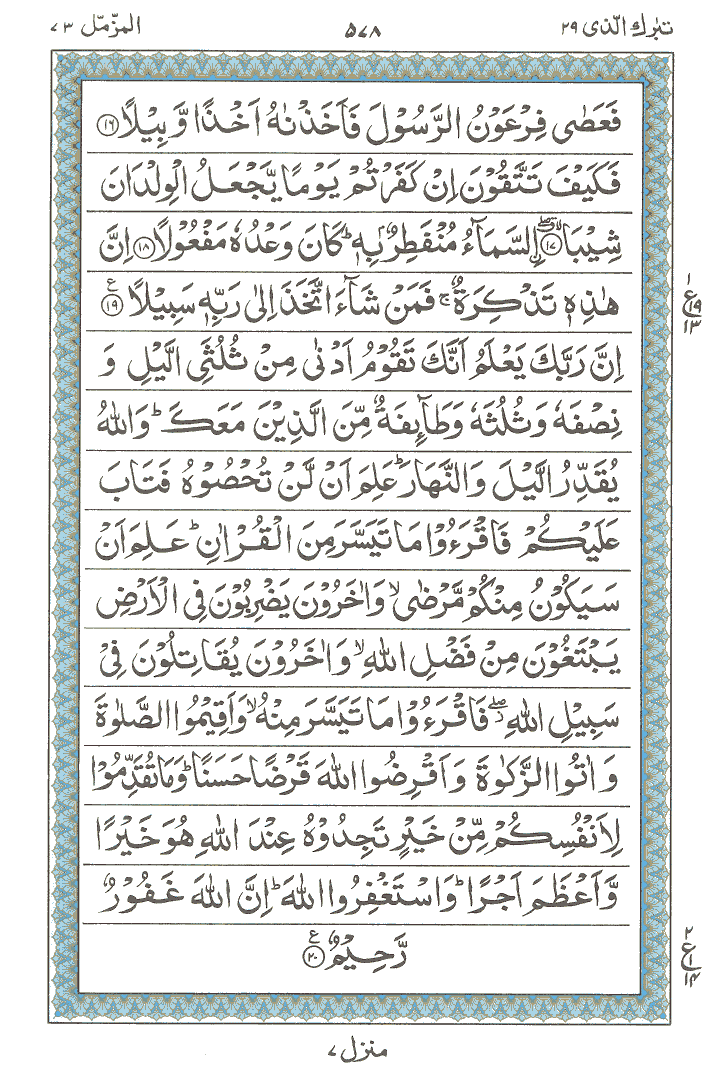



























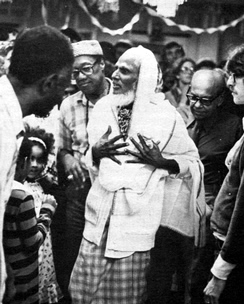



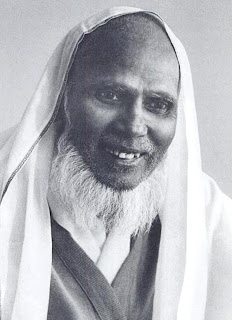









.jpg)


















